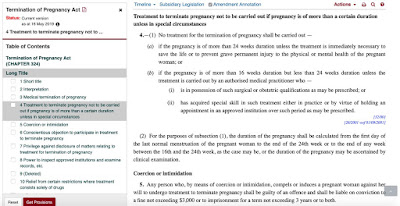We all know personal stories of triumph and tragedy, of women who chose abortion and would either get over it or be haunted forever by it. Regardless, it is not a choice taken lightly. Unlike what the conservatives preach, abortion isn't exactly used as a first-choice method of birth control. It's the last resort and I can't see a huge percentage of women opting for abortion just because it's available and without legal repercussions. The Washington Post did a wonderful summary of the state of the abortion bill in the United States, and kept it updated.
 |
| From the article: the map depicts where abortion is currently most protected and restricted as measured by the Guttmacher Institute, a group working for abortion rights. |
Why should the American abortion bill in its states matter to me? It does. It matters to me that we protect the secularity of our laws and not pass stupid for the norm, and not use the guise of religious and ethnic harmony to push through rigid rules and oppress women. Lawmaking isn't entirely secular. It is also driven by culture, society and religion. It's frightening if conservatives take over the Singapore government. As much as our government is secular, certain policies can be tweaked to allow for religious conservative voices to take hold. Actually, I prefer to call those ‘the far right’.
Abortion belongs to the most controversial of all political causes and national bills. There's much to be debated about it. Making the decision to abort an embryo or a fetus in utero is already a painful choice. (No matter the reason, no matter the age of the women.) The emotional scars last forever; women carry this choice for life. They bear the brunt of everything that stems from this choice (to abort, or not). To penalize them for such a choice is an act of judgment that others may take, but that currently comes from a moral high ground. At the very least, women who ultimately choose abortion as their only path could legally do so in Singapore. This allowance protects vulnerable women in Singapore. However I'm not sure now if this is our right or our privilege.
I'm glad that women in Singapore don't have to go to unlicensed doctors and unsanitary clinics for abortions. Respect, dignity, religious mores and social values come into play. I fear for the day when Singapore is pushed to review our seemingly pro-choice laws. Today I'm thankful for Singapore's 'Termination of Pregnancy Act' in Chapter 324 of our statutes, originally enacted in 1974, and revised in 1985. I highly doubt it has anything to do with the political party being liberal. That's the last thing I would use to describe it, but of course Singapore never claims to follow the typical textbook model of democracy.
Conscientious objection to participate in treatment to terminate pregnancy
6.—(1) Subject to subsection (3), no person shall be under any duty whether by contract or by any statutory or legal requirement to participate in any treatment to terminate pregnancy authorised by this Act to which he has a conscientious objection.
(2) In any legal proceedings the burden of proof of conscientious objection referred to in subsection (1) shall rest on the person claiming to rely on it and that burden may be discharged by such person testifying on oath or affirmation that he has a conscientious objection to participating in any treatment to terminate pregnancy.
(3) Nothing in subsection (1) shall affect any duty to participate in such treatment which is immediately necessary to save the life or to prevent grave permanent injury to the physical or mental health of a pregnant woman.

No comments:
Post a Comment